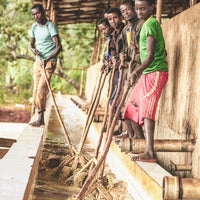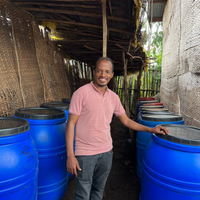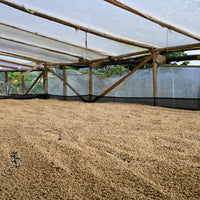Origin: Costa Rica
Region: Pérez Zeledón
Altitude: 1400 - 2000 meters above sea level
Farm: 391 small-scale farmers from CoopeAgri
Washing Station: CoopeAgri
Variety: Caturra & Catuai
Process: Natural
Tasting Notes: Soft and sweet with notes of rose, blueberry jam, spiced cocoa and vanilla.
CoopeAgri, one of the largest farmer cooperatives in Costa Rica, was founded in 1962 by
391 small-scale farmers with the aim of bringing development opportunities to their communities. Today they have over 8,000 members growing coffee on plots averaging 1.3 hectares and employing 700 workers.
The cooperative produces Café Don Claudio, honouring Claudio Gamboa Calderón who was one of the founding members and also a great advocate for the cooperative. The coffee is grown in the highlands surrounding Cerro Chirripó. Located in the Pérez Zeledón region, this area has mountainous terrain and volcanic soil, as well as altitudes ranging from 1400 – 2000 masl, ideal for growing sweet and dense coffee beans.
There are 200 producer associates from 7 selected towns harvesting 250 hectares between December and February. The farmers carefully harvest cherries and deliver them to a nearby wet mill. This lot is dried under the sun with the fruit pulp and stored in GrainPro bags to maintain its sweet and fruity flavours.
Café Don Claudio came out on top in this year’s Golden Cup Fair Trade Coffees 2023, winning first place by scoring an 85 point rating in the Fancy Wash category. This competition is known for its high standards and has greatly contributed to improving coffee quality in Latin America.
In 1998, CoopeAgri became Fairtrade Certified for sugar cane and in 2004 they extended their certification to cover coffee. In 2022, Don Claudio coffee produced by the cooperative took part in the Cup of Excellence contest and passed the first stage.
CoopeAgri is dedicated to supporting their members and improving the well-being of farming communities. Projects such as building medical offices for access to healthcare and creating an agronomy support program demonstrate this commitment. The co-op also produces organic fertiliser for members so that they can maintain ecologically healthy farms and runs a local café showcasing their coffees.







